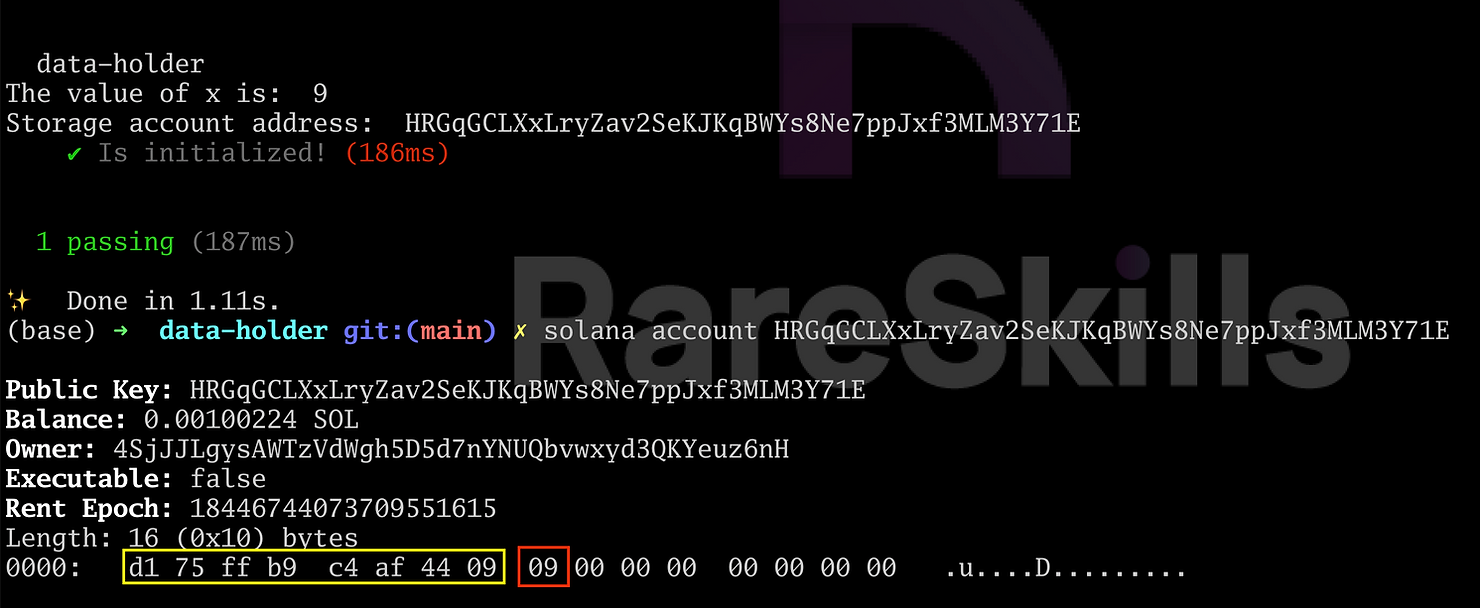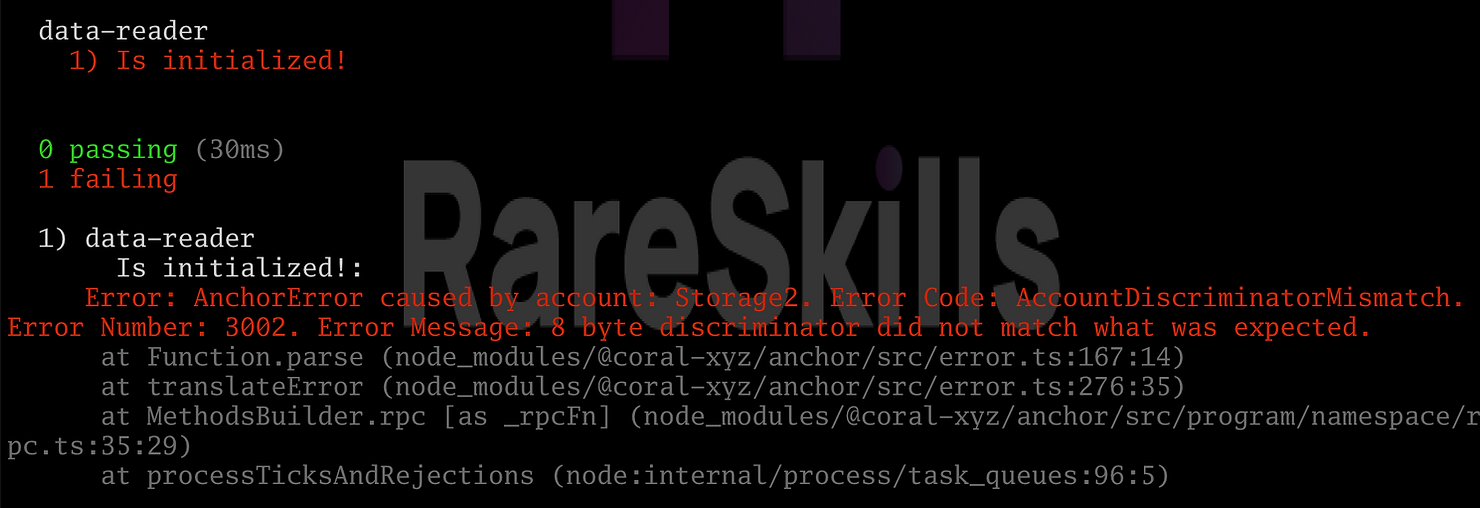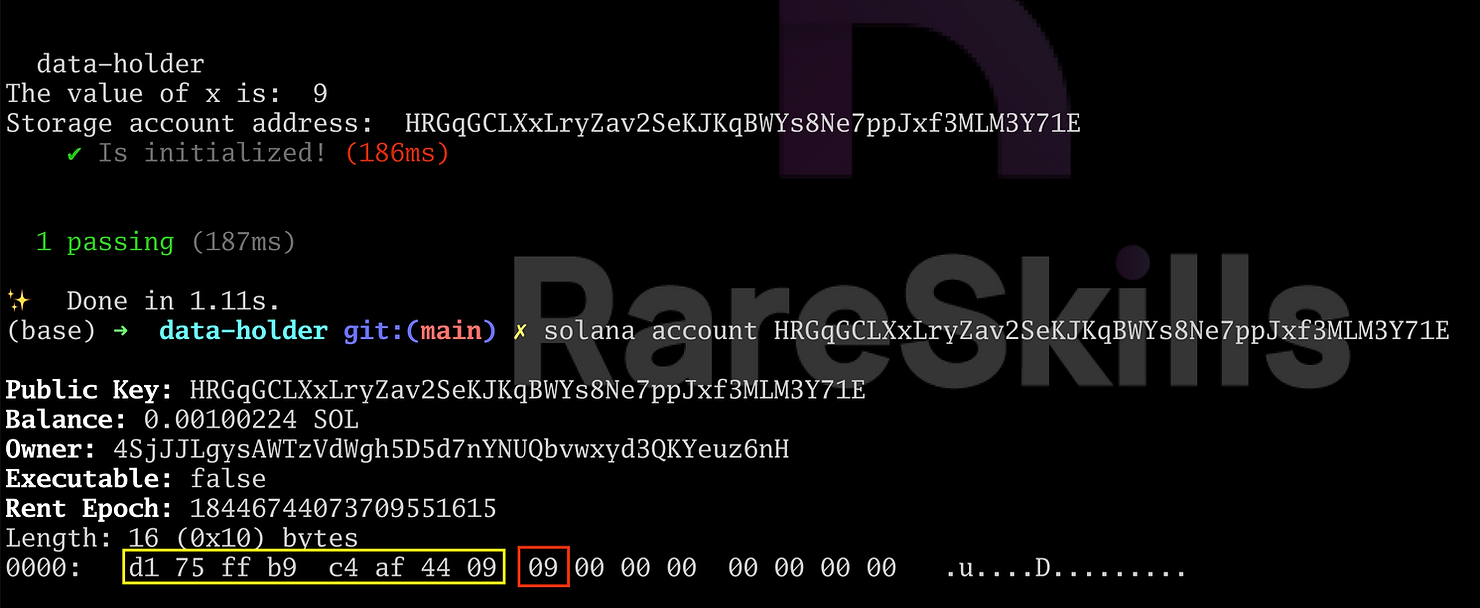Reading Another Anchor Program’s Account Data On Chain
In Solidity, reading another contract’s storage requires calling a view function or the storage variable being public. In Solana, an off-chain client can read a storage account directly. This tutorial shows how an on-chain Solana program can read the data in an account it does not own.
We will set up two programs: data_holder and data_reader. data_holder will initialize and own a PDA with data that data_reader will read.
Set up the data_holder program storing the data: Shell 1
The following code is a basic Solana program that initializes account Storage with u64 field x and stores the value 9 in it at initialization:
Typescript code:
import * as anchor from "@coral-xyz/anchor";
import { Program } from "@coral-xyz/anchor";
import { DataHolder } from "../target/types/data_holder";
describe("data-holder", () => {
anchor.setProvider(anchor.AnchorProvider.env());
const program = anchor.workspace.DataHolder as Program<DataHolder>;
it("Is initialized!", async () => {
const seeds = [];
const [storage, _bump] = anchor.web3.PublicKey.findProgramAddressSync(
seeds,
program.programId
);
await program.methods
.initialize()
.accounts({ storage: storage })
.rpc();
let storageStruct = await program.account.storage.fetch(
storage
);
console.log("The value of x is: ",storageStruct.x.toString());
console.log("Storage account address: ", storage.toBase58());
});
});
The test will print out the address of the PDA, we will refer to this address shortly:

Reader
For the data_reader to read another account, that public key of that account needs to be passed as part of the transaction via the Context struct. This is no different from passing any other kind of account.
Data in accounts is stored as serialized bytes. In order to deserialize the account, the data_reader program needs a Rust definition of struct it is reading. We will need the following account definition available to data_reader, which is identical to the Storage struct in data_holder:
#[account]
pub struct Storage {
x: u64,
}
This struct is perfectly identical to the one in data_reader — even the name must be the same (we will get into the details of why later). The code to read the account is in the following two lines:
let mut data_slice: &[u8] = &data_account.data.borrow();
let data_struct: Storage =
AccountDeserialize::try_deserialize(
&mut data_slice,
)?;
The data_slice is the raw bytes of the data in the account. If you run solana account <pda address> (using the PDA address generated when we deployed data_holder) you can see the data there, including the number 9 we stored in the red box:

The first 8 bytes in the yellow box are the account discriminator, which we will describe later.
The deserialization happens at this step:
let data_struct: Storage =
AccountDeserialize::try_deserialize(
&mut data_slice,
)?;
Passing the type Storage (the same struct we defined above) here tells Solana how to (try) to deserialize the data.
Now let’s create a separate anchor project in a new folder anchor new data_reader.
Here is the complete Rust code:
use anchor_lang::prelude::*;
declare_id!("HjJ1Rqsth5uxA6HKNGy8VVRvwK4W7aFgmQsss7UxePBw");
#[program]
pub mod data_reader {
use super::*;
pub fn read_other_data(
ctx: Context<ReadOtherData>,
) -> Result<()> {
let data_account = &ctx.accounts.other_data;
if data_account.data_is_empty() {
return err!(MyError::NoData);
}
let mut data_slice: &[u8] = &data_account.data.borrow();
let data_struct: Storage =
AccountDeserialize::try_deserialize(
&mut data_slice,
)?;
msg!("The value of x is: {}", data_struct.x);
Ok(())
}
}
#[error_code]
pub enum MyError {
#[msg("No data")]
NoData,
}
#[derive(Accounts)]
pub struct ReadOtherData<'info> {
/// CHECK: We do not own this account so
// we must be very cautious with how we
// use the data
other_data: UncheckedAccount<'info>,
}
#[account]
pub struct Storage {
x: u64,
}
And here is the test code to run it. Be sure to change the address of the PDA in the code below:
import * as anchor from "@coral-xyz/anchor";
import { Program } from "@coral-xyz/anchor";
import { DataReader } from "../target/types/data_reader";
describe("data-reader", () => {
anchor.setProvider(anchor.AnchorProvider.env());
const program = anchor.workspace
.DataReader as Program<DataReader>;
it("Is initialized!", async () => {
// CHANGE THIS TO THE ADDRESS OF THE PDA OF
// DATA ACCOUNT HOLDER
const otherStorageAddress ="HRGqGCLXxLryZav2SeKJKqBWYs8Ne7ppJxf3MLM3Y71E";
const pub_key_other_storage = new anchor.web3.PublicKey(
otherStorageAddress
);
const tx = await program.methods
.readOtherData()
.accounts({ otherData: pub_key_other_storage })
.rpc();
});
});
To test out reading another accounts’ data:
- Run the test
data_holderwith thesolana-test-validatorrunning in the background. - Copy and paste the printed public key of the
Storageaccount - Put that public key into the
otherStorageAddressof the test fordata_reader - Run the Solana logs in another shell
- Run the test for
data_readerto read the data.
The following should be visible in the Solana logs:

What happens if we don’t give the structs the same name?
If you change the Storage struct in data_reader to a name other than Storage, say Storage2 and try to read the account, the following error will occur:

The account discriminator computed by Anchor is the the first eight bytes of the sha256 of the struct name. The account discriminator does not depend on the variables in the struct.
When Anchor reads the account, it checks the first eight bytes (the account discriminator) to see if it matches the account discriminator of the struct definition it is using locally to deserialize the data. If they do not match, Anchor will not deserialize the data.
Checking the account discriminator is a safeguard against the client accidentally passing in the wrong account or an account whose data is not in the format Anchor is expecting.
Deserializing will not revert if parsing a larger struct
Anchor only checks if the account discriminator matches — it does not validate the fields inside the account being read.
Case 1: Anchor does not check if the struct field name matches
Let’s change x field in the Storage struct in data_reader to y, leaving the Storage struct in data_holder unchanged:
// data_reader
#[account]
pub struct Storage {
y: u64,
}
We will also have to change the log line as follows:
msg!("The value of y is: {}", data_struct.y);
When we re-run the test, it successfully reads the data:
Program log: Instruction: ReadOtherData
Program log: The value of y is: 9
Case 2: Anchor does not check the data type
Now let’s change data type of y in Storage in data_reader to u32 even though the original struct is u64.
// data_reader
#[account]
pub struct Storage {
y: u32,
}
When we run the test, Anchor still successfully parse the account data.
Program log: Instruction: ReadOtherData
Program log: The value of y using u32 is: 9
The reason this “succeeded” is because of how the data is laid out:

The 9 in 7 is available in the first bytes — a u32 will look for data in the first 4 bytes so it will be able to “see” the 9.
Of course, if we were to store a value in x that u32 cannot hold, such as $2^{32}$, then our reading program will print wrong number.
Exercise: Reset the validator and re-deploy data_holder with the value $2^{32}$. The way to raise to a power in Rust is let result = u64::pow(base, exponent). For example, let result = u64::pow(2, 32); See what value gets logged by data_reader.
Case 3: Parsing more data than is there
The storage account is 16 bytes large. It holds 8 byte for the account discriminator, and 8 bytes for the u64 variable. If we try to read more data than is there, such as by defining a struct with values that require more than 16 bytes to hold, the deserialization on read will fail:
#[account]
pub struct Storage {
y: u64,
z: u64,
}
The struct above requires 16 bytes to store y and z, but an additional 8 bytes are needed to hold the account discriminator, making the account 24 bytes large.

Parsing Anchor account data summary
When reading the data from an external account, Anchor will check if the account discriminator matches and that there is enough data in the account to be deserialized into the struct used as the type for try_deserialize:
let data_struct: Storage =
AccountDeserialize::try_deserialize(
&mut data_slice,
)?;
Anchor does not check the names of the variables or their length.
Under the hood, Anchor does not store any metadata for how to interpret the data in the account. It is simply the bytes of the variables stored end-to-end.
Not all data accounts follow Anchor’s convention
Solana does not require the use of account discriminators. Solana programs written in raw Rust — without the Anchor framework — will likely store their data in a way that is not directly compatible with the Anchor’s serialization method which AccountDeserialize::try_deserialize implements. To deserialize non-anchor data, the dev must know in advance the serialization method used — there is no enforced universal convention in the Solana ecosystem.
Exercise caution when reading data from arbitrary accounts
Solana programs are upgradeable by default. The manner in which they store data in their accounts could change at any time which could break the program that is reading from them.
Accepting data from arbitrary accounts is dangerous — one should generally check the account is owned by a trusted program before reading the data from it.
Originally Published May, 7, 2024